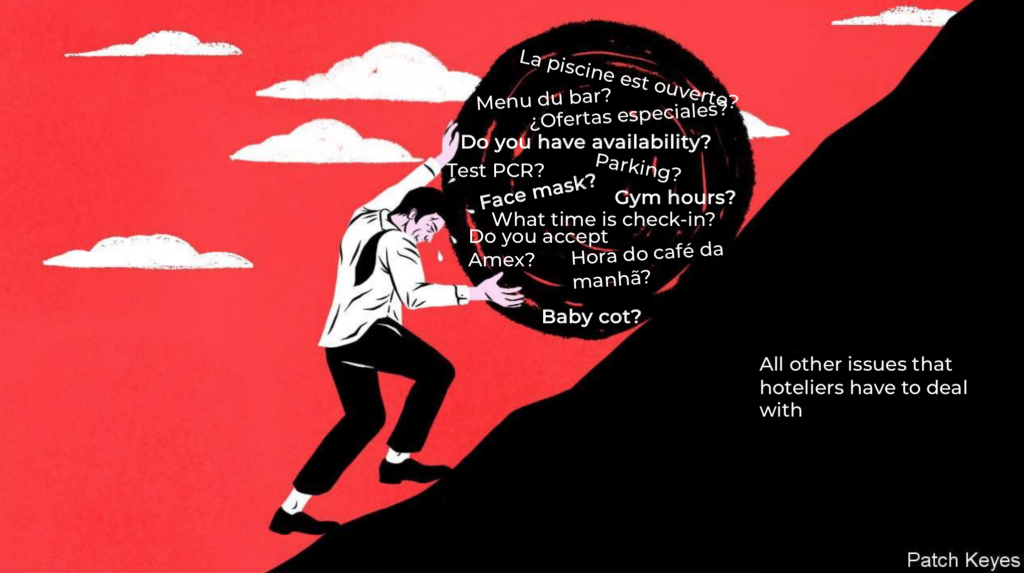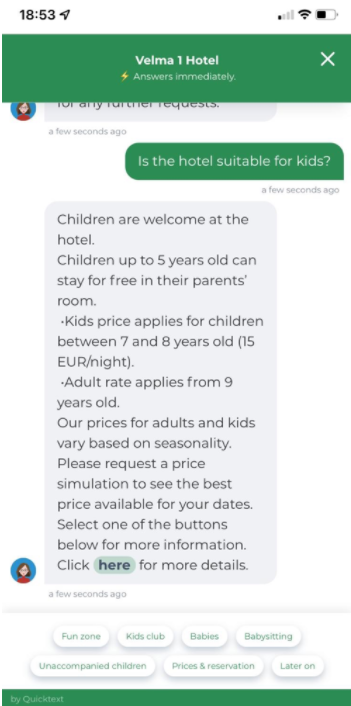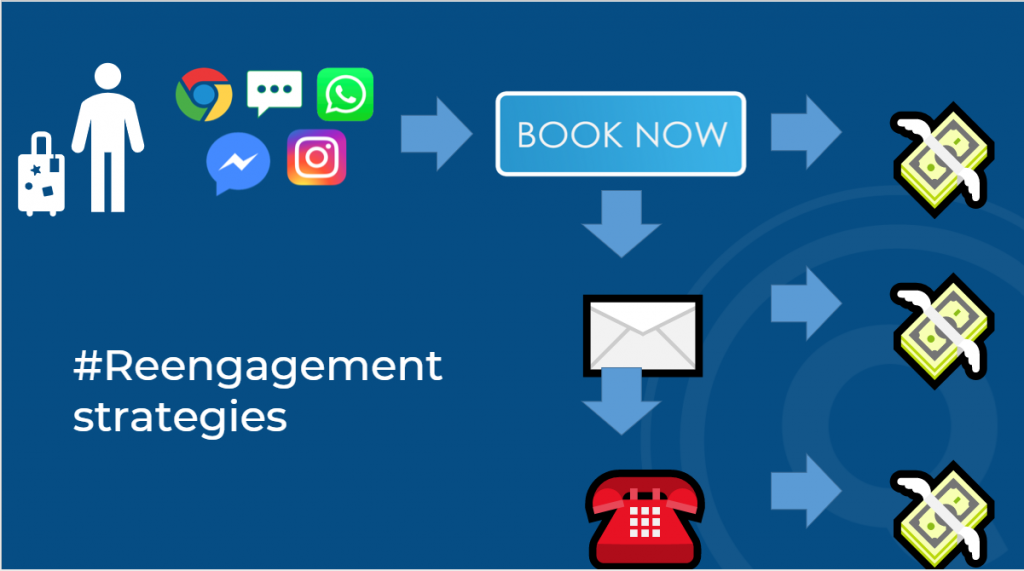Conversational AI has improved rapidly in recent years and is gaining popularity in the hospitality industry as hoteliers face staff shortage and need to reduce costs in the aftermath of the COVID-19 pandemic. However, some hotel owners are still unsure of what conversational AI can offer to in the hospitality industry, and how this innovative technology improves guest experience.
77% of guests are more likely to recommend your business to family and friends after receiving a satisfactory customer service experience*. The same goes for your hotel, as word of mouth is a great deal in our industry in terms of brand power, number of direct bookings, and reputation.
Artificial intelligence in the hospitality industry offers a unique opportunities for hotels to become more customer-centric, increase direct sales and automate various operations like hotel bookings, handle FAQ, query support, payments, guest lead qualification, and a lot more.
With a conversational AI chatbot for hotels, you can successfully fulfill the needs and expectations of today’s digital-native travelers. Hospitality chatbots powered by AI can streamline guest experience across all digital platforms and provide them with instant and personalized assistance.
What Is A Conversational AI Platform ?
AI-powered messaging solutions are also known to include virtual assistants, conversational bots or chatbots.
A conversational bot is a computer program that works automatically and is able to communicate through various digital media—including organizational applications, organizational websites, social media platforms, and messaging platforms. Users can interact with such bots, using voice or text, to access information, perform tasks, or execute transactions.
Intelligent virtual agents — such as Google Assistant, Apple’s Siri, and Amazon’s Alexa— are themselves conversational bots, upon which third parties can build “skills” or unique conversational interactions by leveraging the Artificial Intelligence (AI), Natural Language Processing (NLP) and Machine Learning (ML) APIs/services these platform providers offer.
The Benefits of Conversational AI in the Hospitality Industry
Channel Customer Interaction
On the one hand, you have customers that want to clear their doubts and receive support. On the other hand, you have a hotel team saturated with calls, emails, social media messages etc. Some customers are always going to call but a lot of them will welcome the opportunity to chat.
Quicktext Conversational AI and messaging solution centralizes all digital channels in 1 place your web chat, Facebook, Instagram, WhatsApp and Google business chat (look at Google Business chat with interest because it is new, and the potential is huge.
In this short Tutorial by Google Team you will learn how to leverage Google Business Chat in your direct sales process. This video is not meant specifically for hotels so it is interesting to see what is happening in other industries as well.
Improve customer service without burning out your staff.
AI filters customer conversations and responds automatically to repetitive requests. For frequent questions, time is of the essence: For example, from a customer perspective it is irritating not to know instantly the time of check-in, the existence of a parking, and any information he wants about any hotel amenity.
Only customer conversations that require special attention are escalated to staff to enable your team to immediately detect and resolve important issues that might otherwise have been lost in the flow of requests that your hotel gets every day.
Please note that AI is not here to replace but to augment your staff at any time you are not able to intervene in a conversation.
Increase direct bookings
As discussed, Quicktext enlarges your sales funnel and drives qualified customers to your booking process.
If the customer doesn’t book, a proactive follow up process takes place: email/phone and the average conversion rate is between 20% and 30% depending on the hotel and the overall follow up strategy..
AI enables proactive follow up processes. Customers are able to interact with the hotel virtual assistant and get information about the hotel through all digital channels. While guiding customers through the booking process and ultimately to the booking engine, the AI also gets actionable information (and GDPR consent) to be able to re-engage the customer by email or forward highly valuable leads to the hotel reservation team that will follow up by phone. This kind of process mechanically leads to higher conversion.
Saving Time, Cost and Effort
Most of the FAQs and routine queries that you get on a daily basis can be solved instantly 24/7 with automated AI-powered hotel chatbots. Some hotels will leverage this technology to reduce labor costs, others will prefer to keep the same team but focus their effort on tasks that generate more value and that were impossible to handle when every interaction was handled manually.

Without AI hoteliers have to manually handle every tasks order of arrival and cannot organize them. AI enables your team to instantly and automatically resolve repetitive requests and focus their attention on highly valuable tasks.
Communicate in Multiple Language
Whether you’re using a rules-based or AI hotel chatbot, you can provide support for several different languages. This can be particularly useful for hotels, as clients come from all over the world, and it is probably not viable to hire staff with all the necessary translation skills.
With AI chatbots, translation becomes possible in an instant, which means customers can get their specific questions answered, in their language, whatever language they use.
Personalized Service
AI-powered chatbots in the hospitality industry help hotels provide guests with a much more personalized experience by delivering to them the information they ask for instantly, and this can start before the guest has even started the booking process.
On top of answering customer questions, AI can go 1 step further and nudge customers with intelligent recommendations that can be made either before or during the booking process.
By asking intelligent follow-up questions, a smart hotel artificial intelligence can determine guest preferences and then continue to give recommendations such as attractions to visit, things to do, car rental services to use, or places to eat. Customer preferences can also be saved and sent to a hotel CRM to boost future hotel marketing campaigns.

A customer that asks about kids might also be interested in learning about other related services that the Artificial Intelligence determines and offers to the customer in the form of suggestions. This helps keep the customer engaged with your hotel.
Providing Opportunities of Upsell and Cross-Sell
In addition to helping increase direct bookings, AI chatbots in the hospitality industry can also provide a hotel with more upselling and cross-selling opportunities.
Example of upsell process powered by AI: customers are able to request an early check-in with AI.
Here customers are able to request an early check-in with AI.
Improve guest satisfaction during stay
Most guests do not spend much time at the front desk so it is very handy for guests to be able to instantly get information about the hotel services such as Swimming pool opening times, book a table at the restaurant, request a late check-out, etc…
In addition, hoteliers can create smart push messages that will be triggered to specific guests. This is pure messaging automation and does not actually require AI but it goes hand in hand.
Usually hoteliers use this kind of feature for upsell, guest recovery and comfort.
In this example the Front desk can program SMS or WhatsApp messages to be sent to the guest automatically to suggest an upsell.
This is an example of guest recovery through WhatsApp. An issue is quickly detected and directed to the right member of staff enabling fast and efficient resolution while the guest is still on site. It is a good idea for hotels to automate a proactive push message to check that everything is OK for guests that stay several nights.
Quicktext provides all these features through Velma AI chatbot which helps hotels capture more direct bookings, improve guest experience and streamline operations. Velma AI chatbot centralizes the main instant messaging channels that hotel and guests can use to communicate such as live chat, Facebook, WhatsApp, Instagram, SMS, Wechat.
Quicktext chatbot instantly handles frequent inquiries and interactions such as booking a room, check-in time, airport transfer, parking, pets accepted, etc. Quicktext chatbot helps hotels increase online direct revenues by 11% on average.
Quicktext AI chatbot answers customer queries instantly, 24/7 in 26 languages, and will automatically enrich the hotel’s CRM with valuable customer information such as preferences, dates of stay… gathered from the conversation.
Abstract
Conversational AI in the Hospitality Industry provides solutions to more than 700,000 hotels around the world, this sector has been suffering due to the travel restrictions which limited the number of potential guests, the aforementioned features are able to reduce the effect of pandemic restrictions and make the operation of the hospitality industry better and easier.
According to research by Accenture (see “About the Research”), CIOs and CTOs around the world believe conversational bots will play a critical role in the enterprise architecture of the future—and have the potential to make a huge impact on a company’s operations.
56% say conversational bots are driving disruption in their industry, and 43 % report their competitors are already implementing the technology. Furthermore, 57 percent agree that conversational bots can deliver large return on investment for minimal effort*.
*According to Temkin study, 2018.
Customer Experience Leads to recommendations ( charts for 20 Industries)
*Accenture Experience Orchestration as a Service Survey, 2017.
FAQ



